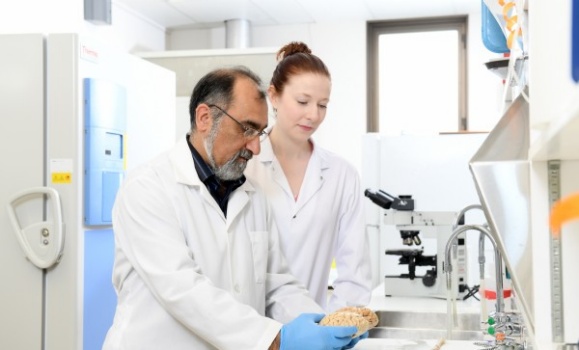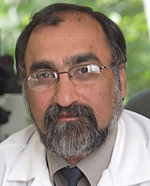» Go to news main
Molly Appeal to support advanced brain research with new tissue processing machine

Dalhousie Medical Research Foundation is launching a new spring Molly Appeal to raise funds for a vital piece of equipment used extensively by Dalhousie Medical School neuroscience researchers, as well as many others at Dalhousie Medical School whose research in the areas of cancer, cardiology and immunology relies on detailed tissue analysis.
The equipment is an automated tissue processor that fixes the tissues in place so they can be cut into fivemicron-thick slices for examination under a microscope.
 “Five microns is about one-fiftieth the thickness of a human hair,” says Dr. Sultan Darvesh, a Dalhousie neurologist and director of the Maritime Brain Tissue Bank. “Brain tissues are very delicate… they must be prepared in a way that does not disturb any of the structures, and fixed so they can be cut into microscopic slices without moving a single molecule out of place.”
“Five microns is about one-fiftieth the thickness of a human hair,” says Dr. Sultan Darvesh, a Dalhousie neurologist and director of the Maritime Brain Tissue Bank. “Brain tissues are very delicate… they must be prepared in a way that does not disturb any of the structures, and fixed so they can be cut into microscopic slices without moving a single molecule out of place.”
It is through studying such tissues that Dr. Darvesh and his team have identified a crucial enzyme involved in Alzheimer’s disease. Based on this work, they are now well on their way to launching the first-ever technology for diagnosing Alzheimer’s disease in a living person’s brain. At the same time, they are testing compounds they’ve developed to block the enzyme and stop the disease in its tracks.
Ongoing tissue analysis is essential to this research. “Properly prepared brain tissues allow us to see individual neuron bodies and their axons,” Dr. Darvesh says. “We can even see the synapses, the gaps between axons that electrical impulses must bridge to send and receive messages in the brain. We believe the loss of synapses is the first shift towards neurodegenerative disease, followed by axons and the neuron bodies themselves. We want to detect the disease and intervene just as the synapses are starting to weaken, before brain function has been lost.”
This spring’s Molly Appeal provides Maritimers with the opportunity to support world-class research on the brain taking place right here in the region, at Dalhousie Medical School. Every dollar raised will go directly toward the purchase of the Leica HistoCore PEARL tissue processor, a $50,000 machine.
“The tissue processor is the beating heart of the Histology Lab,” says Dr. David Waisman, a professor in the departments of Pathology and Biochemistry & Molecular Biology who examines brain tissues for signs that proteins in the blood have leaked into the nerve tissue, where they can cause damage that leads to disease.
Dr. Waisman chairs the Histology Lab Working Group and spearheaded the application to raise funds for the Leica HistoCore PEARL. “It is an essential piece of equipment more than three dozen researchers require to advance their work in neuroscience and many other areas of research, like cancer, cardiology, and immunology,” he says. “The new tissue processor will provide much greater efficiency and precision than the outmoded machine it will replace. It will allow our researchers to collect exceptionally detailed information, with absolute confidence in the integrity of their results.”
For more information, contact:
Jane Greenlaw, DMRF Annual Giving Officer, (902) 494-2693 or jane.greenlaw@dal.ca
Melanie Jollymore, Communications Consultant, (902) 222-3393 or melaniejollymore@eastlink.ca
Learn more about the DMRF Spring 2018 Molly Appeal on their website.
Recent News
- New global study Highlights the Biological Roots of Anxiety
- Dalhousie and NCIME launch first‑of‑its‑kind program in Membertou First Nation
- A message from Wanda M. Costen, PhD, Provost and Vice President Academic
- Rhodes scholar Sierra Sparks returns home to study medicine
- President Kim Brooks, Dr. Pat Croskerry appointed to Order of Canada
- Dal’s Highly Cited Researchers reflect on influential global research alliances
- A New Bursary Supporting Black Medical Students at Dalhousie
- Dalhousie’s first physician assistant cohort steps into Nova Scotia’s healthcare system
